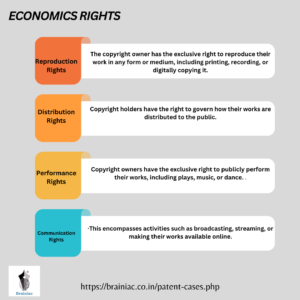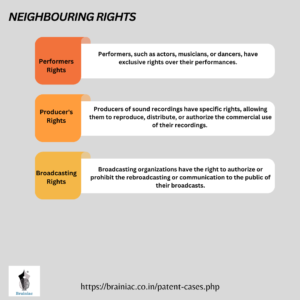Introduction:
Copyright is an important part of intellectual property rights since it offers creators exclusive rights, guaranteeing that their unique creations are protected from unauthorised use. The Copyright Act, 1957, governs copyright law in India and provides a framework to protect creators’ rights. This article investigates the numerous rights granted to copyright holders in India, as well as the systems in place to preserve these rights.
Economic Rights:
Reproduction Right: The copyright owner has the exclusive right to reproduce their work in any form or medium, including printing, recording, or digitally copying it. This right allows creators to control the replication and distribution of their works.
Distribution Right: Copyright holders have the right to govern how their works are distributed to the public. This includes selling, renting, leasing, or lending copies of copyrighted goods such as books, music, or films.
Public Performance Right: Copyright owners have the exclusive right to publicly perform their works, including plays, music, or dance. This right ensures that creators have control over public presentations of their artistic creations.
Communication to the Public Right: The copyright owner holds the right to control the communication of their work to the public. This encompasses activities such as broadcasting, streaming, or making their works available online.
Adaptation Right: Copyright owners have the right to create adaptations, translations, or derivative works based on their original creations. This enables creators to control the modification and transformation of their works.
Neighbouring Rights
Apart from the economic rights granted to copyright owners, the Copyright Act also recognizes neighbouring rights, which extend protection to performers, producers, and broadcasting organizations
Performers’ Rights: Performers, such as actors, musicians, or dancers, have exclusive rights over their performances. This includes rights related to the live or recorded performances of their works.
Producers’ Rights: Producers of sound recordings have specific rights, allowing them to reproduce, distribute, or authorize the commercial use of their recordings. These rights help protect the investment and efforts put into producing recorded material.
Broadcasting Organizations’ Rights: Broadcasting organizations have the right to authorize or prohibit the rebroadcasting or communication to the public of their broadcasts. This ensures the protection of radio and television broadcasters’ content.
Moral Rights :
In addition to economic and neighbouring rights, copyright law in India recognizes moral rights, which are intended to protect the integrity and reputation of creators.
Right of Attribution: The right of attribution grants the creator the authority to be recognized as the author of their work. It ensures that the creator’s name is associated with the work whenever it is published, displayed, or performed.
Right of Integrity: Creators possess the right to protect the integrity of their work, preventing any distortion, mutilation, or modification that may harm their reputation or honour.
Protection and Enforcement:
To protect the rights of copyright owners in India, the Copyright Act provides several mechanisms:
Registration: While copyright protection exists automatically upon the creation of a work, registration provides additional evidence and legal benefits. Copyright registration is available and recommended to strengthen the claims of copyright owners.
Infringement Actions: Copyright owners can take legal action against any infringement of their rights, seeking remedies such as injunctions, damages, or accounts of profits. Courts in India have the authority to grant these remedies in copyright infringement cases.
Digital Rights Management: With the increasing digital landscape, copyright owners can utilize digital rights management techniques to safeguard their works from unauthorized copying, distribution, or alteration.
Conclusion:
Copyright law in India grants a range of rights to copyright owners, including economic rights, neighbouring rights, and moral rights. These rights provide creators with the necessary control over their works, ensuring fair compensation, recognition, and protection against unauthorized use. By registering their copyrights and taking legal action against infringements, creators can effectively safeguard their intellectual property in India’s dynamic creative landscape




